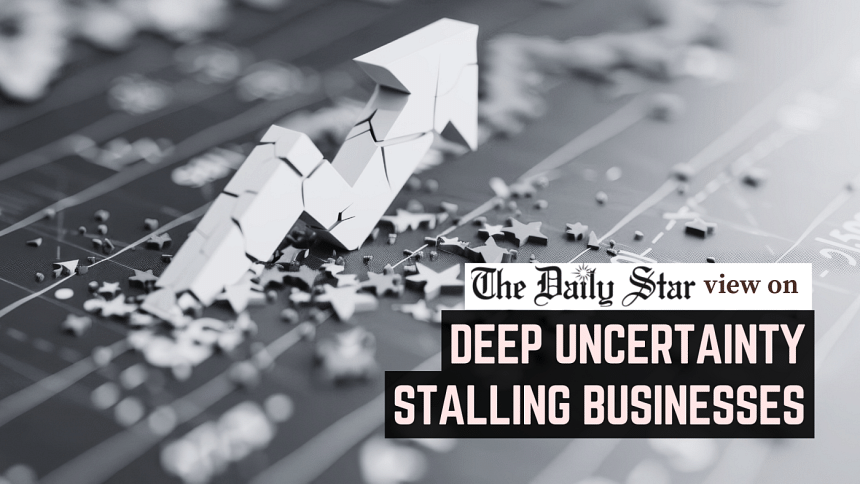Govt must act proactively to address business concerns

It is hardly surprising that economists and business leaders believe deep uncertainty is stalling businesses. We, too, have been highlighting this issue in this column for months. However, the government's continued failure to effectively alleviate such uncertainty is concerning.
At a post-budget dialogue organised by the Centre for Policy Dialogue (CPD), economists warned that the country's business climate is being weighed down by a pervasive sense of uncertainty, which is slowing economic progress. This is reflected in Bangladesh's GDP growth of just 3.97 percent in the current fiscal year—the slowest in 34 years, excluding the pandemic period. Making matters worse, there have been a significant drop in annual imports—which include essential inputs for production—and a decade-low private-sector credit growth of just 7 percent in the first quarter of 2025, which further underscore the signs of economic stagnation. Additionally, businesses are grappling with rising operational costs, largely due to a steep increase in bank borrowing rates.
As a result, business leaders have expressed frustration at having to bear the burden of high interest rates, despite many not being responsible for the looting under the previous government that contributed to increasing interest rates and business costs. They have also called on the authorities to identify those who misappropriated public funds and bring them to justice, rather than raising interest rates to subsidise the stolen money. Another important point raised by the economists is about the government's tendency to "listen without responding." Business leaders have similarly criticised the authorities for failing to engage with them over the recent US tariffs. According to them, this lack of dialogue will only worsen the country's business environment, especially if the inflated duties in the American market are not addressed properly.
The recently approved budget has also been criticised by some economists and business leaders for being overly conventional. Much more was expected, they said, particularly given that four members of the advisory council are economists. This reflects a lack of boldness on the government's part and sends a discouraging signal to the broader business community. Moreover, the changes to the income tax threshold—which will disproportionately increase the burden on low- and middle-income earners over the next two fiscal years, while those in higher income brackets face only a modest rise—are also disappointing.
Given the circumstances, the government must not only take these concerns seriously but also engage with relevant stakeholders, especially business leaders, to explore possible solutions. The uncertainties that are stifling businesses must be addressed immediately. Otherwise, the economy will continue to suffer, with potentially severe consequences for both citizens and the country in the long run.

 For all latest news, follow The Daily Star's Google News channel.
For all latest news, follow The Daily Star's Google News channel. 











Comments